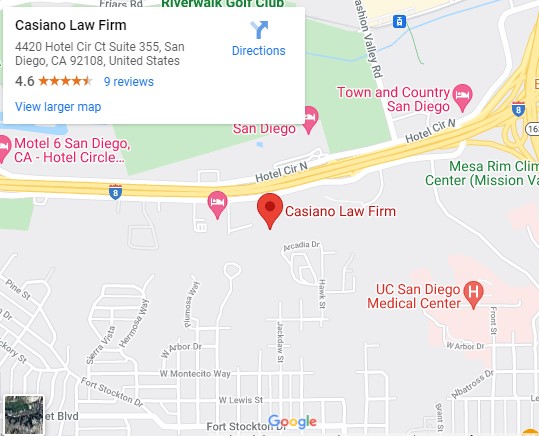Duties and Responsibilities of a Trustee in California
Planning for the future is important to ensure that your children are well taken care of and your assets are preserved for your family and loved ones. One way to be sure that your assets are protected is to set up a trust. Our knowledgeable San Diego estate planning lawyers can help you understand the importance of creating trusts as part of your estate plan.
Attorney Vincent Casiano has extensive legal experience in creating trusts, wills, durable powers of attorney, and other estate planning matters. He helps families plan for their estates and their beneficiaries, both during life and legacy planning. He can also assist you in dealing with the challenges that come with the administration of a loved one’s trust or estate.
Contact Attorney Vincent Casiano to schedule an initial consultation.
Why Do I Need an Estate Planning Attorney in California?
Setting up a trust can set clear expectations for the use of your assets, either during your lifetime or after your death.
When naming a trustee or successor trustee for your trust or if you have been appointed as a trustee, you may seek legal advice from a skilled San Diego estate planning attorney at Casiano Law Firm. He will help you understand the duties and responsibilities of a trustee.
Attorney Vincent Casiano represents clients and families in San Diego County and its surrounding areas. He understands the state and federal laws that will impact your estate plan.
He also advises trustees, executors, and other fiduciaries on how to discharge their duties to minimize personal liability exposure and reduce the potential for conflicts with beneficiaries and other parties. Call Attorney Vincent Casiano and schedule an initial consultation.
What is a Trust?

A trust is a legally binding agreement that requires three essential elements: a trustee, a trust property, and beneficiaries. It is a fiduciary relationship in which the trustor/grantor, gives another party (the trustee), the right to hold title to property or assets (trust property) for the benefit of a third party (the beneficiary). Leaving assets and property through a trust avoids the time and expense of the probate process.
A trust can include almost anything from your real estate and life insurance settlement to cash and investments. Trusts may vary in size, scope, and benefits. There are different kinds of trusts: testamentary (created in a will after someone dies); irrevocable (usually cannot be changed); and revocable living trusts.
A credible San Diego estate planning attorney can help you determine the type of trust which suits your estate planning needs.
What is a Trustee?
When someone sets up a trust, they appoint people as trustees to manage the trust and its assets. The trustee is a fiduciary obligated to handle the trust assets following the terms of the trust document and solely in the best interests of the beneficiaries.
The trust document names the trustee and the successor trustee who takes over when the trustee dies. It also lists the property you want to be transferred to the trust and the beneficiaries who should inherit the assets.
When you set up a simple living trust, you are allowed to name yourself as the initial trustee. You will have complete control over the property that will be held in the trust.
If you create a shared living trust, you and your spouse are co-trustees. When the initial trustee, or both trustees, have died, the successor trustee you have named in the trust document takes over. A reliable San Diego estate planning lawyer can assist you in assigning a willing trustee who can manage your trust property.
What are the Duties of a Trustee?
The trustee plays a crucial role in the management and distribution of a trust. The most important thing to remember when you step in as a trustee is that these are not your assets. You are safeguarding them for others—for the grantor (if living) and for the beneficiaries, who will receive them after the grantor dies.
Understanding your duties as a trustee helps you carry out the wishes of the loved one who trusted you to act in their best interests. In addition, it helps you avoid litigation, especially with the trust beneficiaries. A qualified estate planning attorney in San Diego CA can help you determine and understand your roles and responsibilities as a trustee.
Here are some of the most relevant duties of a trustee:
Duty of Loyalty
This duty calls for the trustee to administer the trust solely in the interest of the trust’s beneficiaries. The trustee cannot use the trust for their benefit. The trust must be administered without using the power to the detriment of any beneficiary. Always keep the beneficiaries’ interests as your top priority.
Duty to Administer Trust
A trustee is expected to administer a trust according to the law and the terms of the trust agreement. No matter how good the trustee’s intentions are, the trustee is not free to administer the trust in some other manner. This duty calls for the trustee to precisely adhere to the language of the trust and not stray from it in any way.
Duty to Avoid Conflict of Interest
The trustee must avoid situations in which the trustee has direct or indirect interests that conflict with those of the trust’s beneficiaries. These situations may arise when a beneficiary owns property in which the trust also has an interest or when a trustee wants to purchase a trust asset. The beneficiaries may view it as self-dealing and placing your interests above theirs.
Duty to Deal Impartially with Beneficiaries
If a trust has two or more beneficiaries, the trustee has to deal impartially with them. This duty calls for the trustee to treat every trust beneficiary fairly. A trustee cannot favor one beneficiary over another. This is particularly critical in scenarios where the successor trustee is also a beneficiary.
Duty to Take Control, Preserve, and Make the Trust Property Productive
The trustees are responsible for identifying, controlling, and preserving trust assets. They have to make sure the assets are invested wisely. This applies to situations in which you are acting as a trustee in an ongoing, long-term situation.
Duty to Report and Account to Beneficiaries
One of the roles of a trustee is to keep the beneficiaries informed about the trust administration. Beneficiaries are entitled to a copy of the trust document. The trustee must prepare statements regarding the assets and financial transactions of the trust to the beneficiaries upon request. The report is usually done annually.
Duty to Keep Trust Property Separate and Identified
A trustee must keep their personal assets separate from those of the trust. Trustees should open a bank account in the name of the trust to ensure trust assets stay separate. The mistake of commingling personal assets and trust funds is one of the most common errors done by a trustee.
Duty to Enforce or Defend Claims on Behalf of the Trust
While the trustee is not obligated to participate in trust disputes among beneficiaries, they may be obligated to bring legal action if the trust has a claim against a person or entity. Likewise, they are obligated to defend claims brought against the trust. This is because both types of claims could have financial implications for the trust, and by extension, for the beneficiaries.
A Trustee's Duty to Minor Beneficiaries
In the video, Vinny discusses the unique responsibilities of a trustee or the designation of a guardian to minor beneficiaries. He emphasizes how you can avoid estate guardianship by setting up a trust that will withhold funds for your children’s benefit.
Call an Experienced San Diego Estate Planning Lawyer Now!
Trusts are effective estate planning tools for transferring and managing assets across generations. When an individual establishes a trust to hold and manage assets from your estate, that trust requires a trustee to assume fiduciary responsibilities. Because of this, the choice of trustee is one of the most important decisions that should not be made without careful consideration.
Before starting trust administration, trustees need to understand what it means to owe fiduciary duties. If you have been named as a trustee for someone’s trust, it is highly advisable to seek legal advice from a competent San Diego estate planning lawyer, Attorney Vincent Casiano as soon as possible. He will provide you with legal guidance on how to uphold your fiduciary duties and make ethical decisions. The attorney will assist you throughout the estate administration process to prevent any potential breaches of fiduciary duty. Contact our estate planning law firm now and schedule an initial consultation.

